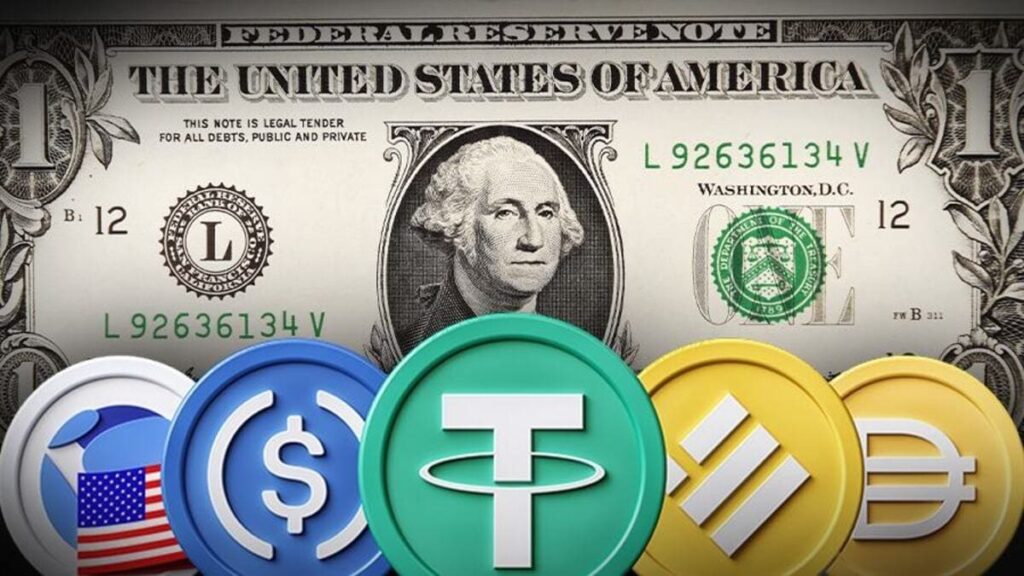Wall Street Tries to Brake Stablecoin Fast Growth as Potential Trillion-Dollar Deposit Run-Off Looms
Banks and cryptocurrency firms are increasingly clashing over new U.S. stablecoin rules, exposing a growing turf war between Wall Street and the digital asset industry. At the heart of the fight is th

Banks and cryptocurrency firms are increasingly clashing over new U.S. stablecoin rules, exposing a growing turf war between Wall Street and the digital asset industry. At the heart of the fight is the fear that stablecoins could spark trillions of dollars in deposit outflows from banks, reshaping the financial system.
The battle follows Congress’s passage in July of the GENIUS Act, a landmark law regulating the $288 billion global stablecoin market. The legislation prohibits stablecoin issuers from directly paying yield or interest to holders. While banks are allowed to issue their own stablecoins, they are barred from offering any returns. In contrast, crypto exchanges may still indirectly reward customers who hold third-party stablecoins such as those from Circle or Tether.
Banking lobbies including the American Bankers Association, the Bank Policy Institute, and the Consumer Bankers Association argue this creates an uneven playing field that could accelerate deposit flight. A U.S. Treasury report earlier this year estimated that, depending on yield availability, stablecoins could drain as much as $6.6 trillion from bank deposits. Industry representatives warn this could undermine credit creation, drive up funding costs, and ultimately result in higher interest rates, fewer loans, and increased costs for businesses and households.
Ronit Ghose, head of Citi’s Future of Finance think-tank, likened the potential shift to the rise of money market funds in the 1980s, when consumers fled traditional accounts for higher-yielding alternatives. Sean Viergutz of PwC added that banks may be forced to raise deposit rates or rely more heavily on wholesale markets, which would make credit more expensive.
The concern is especially acute for smaller lenders. Christopher Williston, president and CEO of the Independent Bankers Association of Texas, called the GENIUS Act “a fundamental threat to bank deposits” for community banks already burdened by years of post-2008 regulation.
Wall Street’s pushback comes as Republicans prepare to advance a second, broader digital asset bill this fall. Banking groups want Congress to retroactively amend the GENIUS Act to block all crypto companies from paying yield and repeal provisions allowing state-chartered, uninsured depositories to operate nationwide without full oversight.
Crypto firms, however, insist the matter is settled. The Blockchain Association and the Crypto Council for Innovation argue that banks are attempting to create an “uncompetitive payment stablecoin environment” that protects legacy institutions at the expense of innovation, consumer choice, and broader industry growth. Coinbase’s chief legal officer Paul Grewal dismissed the banks’ lobbying as a rejected attempt to “avoid competition.”
The fight extends beyond stablecoins. Crypto firms are lobbying to preserve a ban on banks charging for access to customer data, while some on Wall Street are urging regulators to proceed cautiously on efforts to “tokenize” U.S. stocks. Proponents say tokenization would make trading faster and cheaper, but traditional firms such as Citadel Securities and the Securities Industry and Financial Markets Association argue tokenized assets must follow the same rules as conventional shares.
Despite the banks’ concerns, the political momentum is with crypto. Trump’s administration has championed the sector, seeing stablecoins as a new source of demand for U.S. government bonds. Crypto executives have poured hundreds of millions of dollars into lobbying, and the White House has made digital assets a policy priority.
“This is a turf war that’s been going on for years,” said Rep. Warren Davidson, an Ohio Republican and longtime crypto ally. “It is absolutely waking everybody up, whether through a little fear or a little excitement.”
Disclaimer: The views in this article are from the original Creator and do not represent the views or position of Hawk Insight. The content of the article is for reference, communication and learning only, and does not constitute investment advice. If it involves copyright issues, please contact us for deletion.